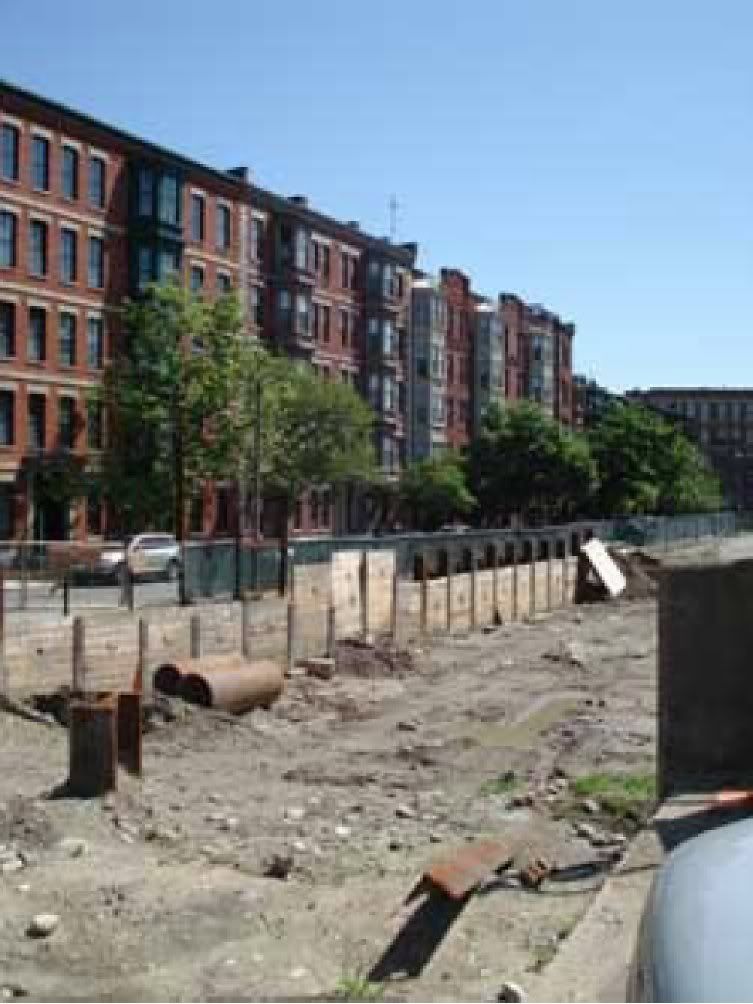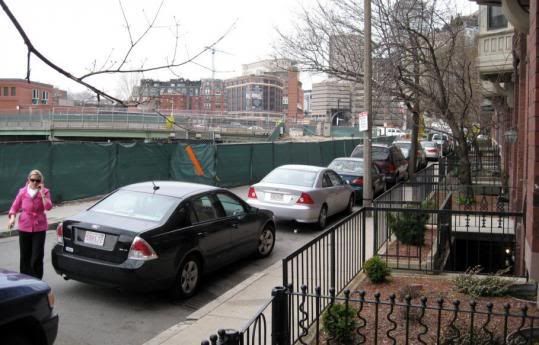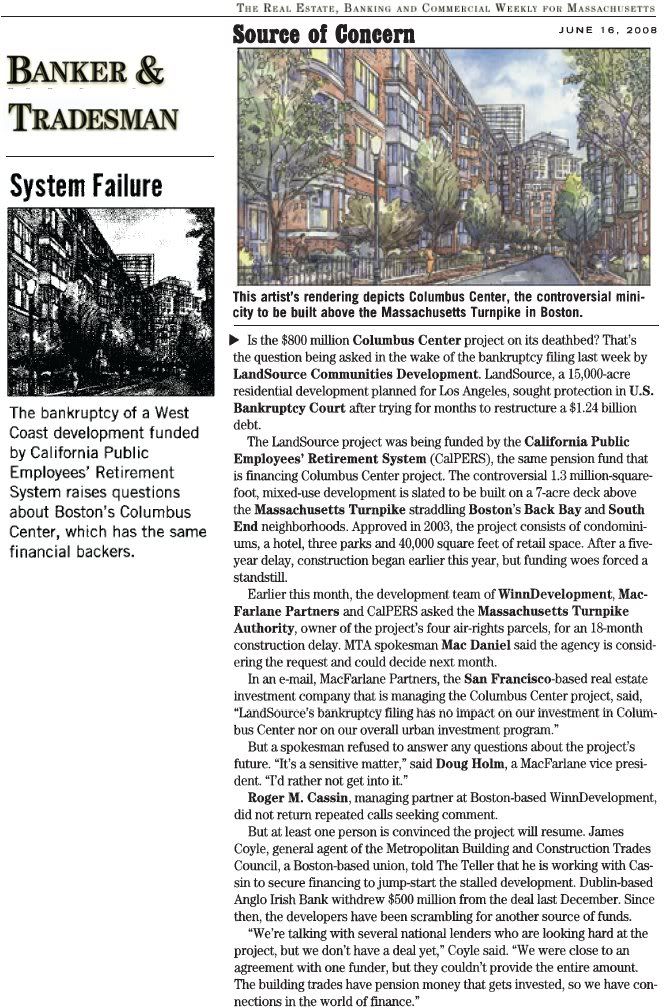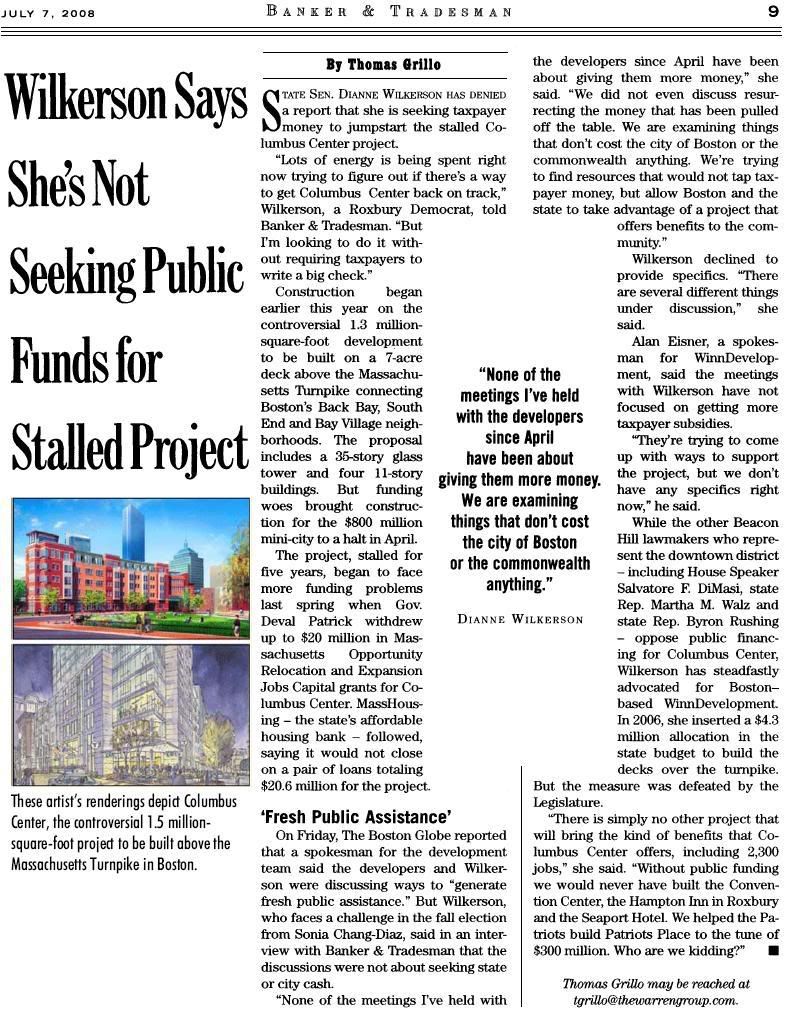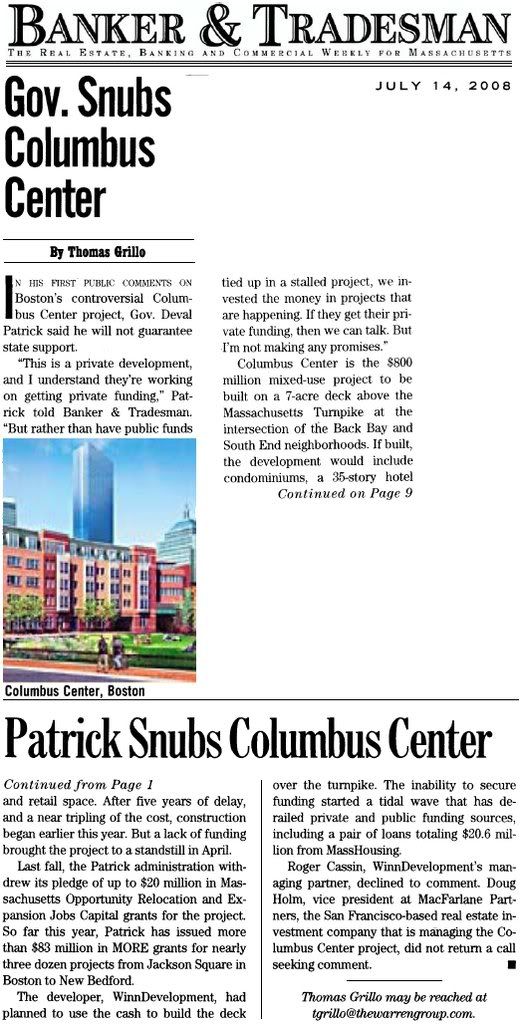Re: Columbus Center
Columbus Center countdown
South End News ● May 29, 2008 ● by Scott Kearnan
The Columbus Center construction site, which started work in November 2007, remains largely abandoned. Photo: SEN staff
At a meeting of the Bay Village Neighborhood Association on May 27, Massachusetts Turnpike Authority (MTA) executive director Alan LeBovidge told the nearly two dozen residents in attendance that the agency would be in talks with the developers of the Columbus Center for project for just one more month.
LeBovidge said that the MTA, which is currently leasing the land to developers of the luxury condo/retail project, would entertain conversation for one more month to determine whether to grant an 18-month "continuance on any further construction" the developers requested in March. He also said that if the developers, a union between the local Winn Development and partners CalPERS (California Public Employees? Retirement System) and MacFarlane Partners, indicate construction will resume as planned at the end of that continuance, the request will be granted and interim measures will be taken to clean up the messy construction eyesore for local residents.
But if the developer is unable to provide assurance of continued progress, said LeBovidge, the MTA will assume that "this [construction] is not going to happen" and will press for full rehabilitation of the razed construction area.
LeBovidge?s reassurances were met with a mixture of hope and skepticism from the residents in attendance, many of whom live on Cortes Street. That street directly abuts the construction site and residents have been given postponed promises of progress in the past. With construction halted while Columbus Center developers look for new funding, these residents have been vocal about the practical and aesthetic consequences resulting from the long hiatus on work: eliminated parking spots, felled trees, and trash dumping, to name a few.
LeBovidge acknowledged their concerns about the stalled construction, and cut the tension with humor as the meeting commenced in a conference room in the South Cove Plaza apartment building. "I got nervous when I saw this," began LeBovidge, indicating a rectangular, cardboard box sitting on a table. "I thought you might put me inside and saw me in two."
The Columbus Center project has long been beset with problems in its development, most specifically ballooning construction costs - more than a decade a go, developers said the seven-acre project could be built for around $300 million. Now, that?s grown to an estimated $800 million.
Construction, which began in November 2007, came to a total standstill, however, when the developers said they were unable to move forward without anticipated state funding for the project. In March, developers requested the 18-month continuance from the MTA because, they said, around $35 million in state grants and loans they felt essential to the project?s "capital structure" remained in limbo. In early April, two weeks after the moratorium was requested, the Patrick administration denied the project a $10 million MORE grant, in part because the developers had stopped construction. The next day, MassHousing announced that it would no longer be closing on $20.6 million in loans it had previously approved for the project. As of now, the project?s future is uncertain, although the developers did say in late April that they?d continue "minimal work" on the site in order to keep it "in play" ("Columbus Center Still in Limbo," May 1).
The back and forth has frustrated local residents, some of whom support the ultimate goal of the project but who are all left with the ramifications of a seemingly inactive, seven-acre construction zone on their front steps.
Clarendon Street resident and longtime critic of the project Ned Flaherty recently authored a petition to circulate among Bay Village and South End residents, outlining the impact of the Columbus Center construction zone on locals. The petition urges the decision makers to whom it is addressed - including LeBovidge and Mayor Thomas M. Menino, among others - to "ensure that the project owners - not the tollpayers or taxpayers - immediately finish and pay for all work to secure and restore the turnpike, sidewalks, streets and neighborhoods to their pre-construction conditions."
"When the [developers] halted construction in March... [decision-makers] promised they?d secure and restore the seven-acre construction site to the condition it was in summer 2007," said Flaherty via email. "But here it is the start of June 2008, and nothing?s been done."
Something may be done soon - interim clean-up measures are already underway. Jessica Shumaker, spokesperson for the Boston Redevelopment Authority (BRA), confirmed that developers are paying Project Place, a South End nonprofit that provides employment opportunities for city homeless, to conduct cleanup of the sidewalks and construction zone while residents wait on the verdict of the project?s future. She said the Project Place efforts should be helpful in addressing resident concerns while respecting that the project?s future remains uncertain. "We are very concerned that the sidewalks are restored and some of the parking restored," said Shumaker.
Clean up will begin within the week and workers will visit the site three times a week to maintain it, Suzanne Kenney, executive director of Project Place, said.
Despite the frustration, many Cortes Street residents are excited to finally see some movement on the cleanup front. "I have to say, the BRA was really responsive. I?m very happy with it," said Lynn Andrews, a resident who emailed the city department about trash dumping she had observed at the site. Andrews reported, corroborated by several other Cortes Street residents, that a mattress, chair, and old television were among objects she saw disposed on the sidewalk outside the construction zone. While they were quickly removed, she said that she feared the inactive site might be viewed as a free-for-all dumping zone and worried the situation would escalate.
But critics like Flaherty wonder how much cleanup work the Project Place team can reasonably accomplish, and whether it is appropriate for them to be the crew in use. Flaherty noted that the developers, in the initial proposal, had promised that all project labor would be paid at union-scale wages with benefits. "The BRA is responsible for enforcing that union-scale promise for all the project?s workers, including workers from Project Place ... The Mayor?s redevelopment staff should enforce the promises that these developers made to get his approval," Flaherty said in his email.
The individuals working with Project Place do not receive union scale; according to Kenney, they are paid an hourly minimum wage with potential for bonuses and incentives. Alan Eisner, spokesperson for the Columbus Center project, responded to Flaherty?s concern by saying, "Yes, we are using Project Place personnel, and that was part of an agreement that the developers made with the City of Boston during the permitting process. It?s the only non-union activity that?s been contemplated."
Speaking more generally to the point of the Columbus Center?s future, however, Eisner said that there has been "no change" in determining how the project will move forward.
END
"Things are as they were last time," said Eisner, referring to a May 1 meeting with the BRA where the developers did not provide any information regarding newly secured funding.

